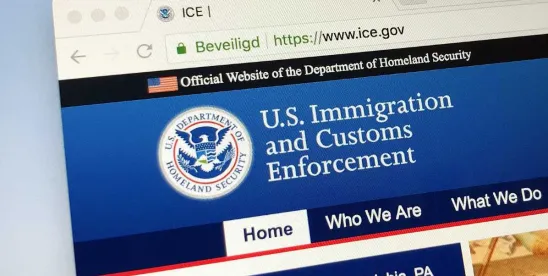In recent weeks, a Louisiana racetrack was raided by the Immigration and Customs Enforcement (ICE), and 84 people were arrested. Several central Kentucky farms were contacted recently by ICE and warned of fines regarding undocumented workers. The Federal government’s promised crackdown on illegal immigrants raises concerns for public and private facilities in both the horse racing industry and the sport horse industry. Employers can expect that ICE may show up on their property or in public settings where racing or horse shows take place or may conduct audits to examine whether any employees are not properly authorized to work. The time to plan is before this happens and to ensure that employees and managers know what to expect and understand their rights.
Most horse farms, horse trainers, racetracks and their employees do not know how to respond or what to do when ICE agents show up unannounced. The uncertainty drives anxiety and fear among employees and their families. Documented and undocumented workers now fear traveling to horse shows and the races, a customarily itinerant lifestyle, which places additional burdens on the employer and other employees who may unexpectedly have to shoulder additional work or be short staffed — particularly problematic as it may create a horse welfare issue.
Agents will seek to search stabling areas and property, retrieve documents, and/or speak to your employees. Here are some dos and don'ts for how to handle the situation when ICE agents arrive unexpectedly.
DO:
- Game Plan. Who is going to speak to ICE on the employer's behalf? Ensure that the person designated is properly trained and is knowledgeable about the employer's rights and those of impacted employees.
- Consult with Immigration Counsel Ahead of Time. Work with counsel to create your plan and identify someone in that firm who can respond quickly to any ICE raid, including an attorney who can be at your location quickly if possible or at the very least be available by phone to handle questions that may arise during a raid.
- For Private Farms, Secure Access Points. If your farm has multiple entrances, consider securing those entrances so that visitors must come through a main entrance and be directed to the farm office. Consider signs that say “All visitors must register at the office.”
- Let Your Employees Know That They Do Not Have to Allow ICE Agents to Enter. Rather, employees can say that they are not authorized to grant permission to enter and that the agents should speak with the manager or managers the employer has designated. Or if you have a lawyer who can come to your business immediately, the designated person should request that the ICE agents wait for counsel to arrive before proceeding. The ICE agent(s) should be invited to sit in a conference room or other area and await someone with authority.
- Advise Your Employees That They Do Not Have to Speak with ICE Agents. They can choose to (1) stay silent, (2) direct any questions to the designated managers, and/or (3) ask for a lawyer. The same advice goes for your designated manager or representative.
- Advise Your Employees That They Do Not Have to Hand Over Any Identification or Documents to ICE. When traveling to horse shows or racetracks, employees should have their documents with them.
- Consider Clearly Marking What Areas Within Your Business are "Private." The public and visitors (which would include ICE agents) cannot enter private areas without permission or proper legal authority.
- Stay Calm During Any ICE Raids and Train Your Employees to Do So. If employees attempt to run, ICE agents may say that they are likely violating immigration laws and arrest them.
- Watch the ICE Agents to See Whether They Are Complying with the Terms of Any Warrant They Present. If state law allows it, video what the ICE agents are doing. Make sure to read the warrant and make a copy if you can.
- Horse Shows and Racetracks Must Cooperate. If ICE has an appropriate warrant, the facility must cooperate. Keep in mind a warrant is not required for public areas. Additionally, the facility will want to ensure as little disruption as possible to public experience.
- If ICE Arrests Any of Your Employees, Ask the ICE Agents Where the Employees are Being Taken. That information will help the employee’s families and/or attorneys locate them.
- Make Notes After ICE Leaves. How many agents were there? What were their names and badge numbers? Did the agents make you or your employees believe you could not move or leave? Did they mistreat anyone? Make note of everything you saw or heard and of any items that were seized. You can also ask the officers for a list of items taken.
- Practice Your Plan so You Can Identify Any Gaps in Training or Knowledge.
- Ensure That You've Done an I-9 Audit Recently. (1) Determine whether there could be any issues with your employee’s documents and (2) have these employee files handy if ICE seeks to audit your documents. Keep files organized by employee in a secure location.
- Proactively Research Local Services That Can Assist. Identify counsel and local community organizations that can provide immigrants with assistance.
DO NOT:
- Let ICE Agents into a Private Area Without a Judicial Warrant. The designated manager needs to review the warrant to ensure it grants agents the ability to go into private places. ICE agents have the right to be in any public areas of your business without permission or a warrant. Those public areas would include the areas of racetracks and horse shows that are available to spectators, a dining area in a restaurant, a lobby, and parking lots. Past raids have occurred when a high profile event was taking place such as an evening Grand Prix show jumping competition where many grooms gather to watch.
- Let ICE into Private Areas with an Administrative Warrant. A judicial warrant is signed by a judge and would say "US District Court" or "State Court" at the top of the warrant. The warrant would also have information concerning i) the time frame for the search, ii) the premises to be searched, and iii) a list of items to be searched and seized. Those items will likely include payroll and time records, I-9 forms, and employee identification documentation. On the other hand, an administrative warrant is not from a court. It would say "Department of Homeland Security" at the top. So if an ICE agent tries to enter a private area and does not have a judicial warrant, you can tell the agent you are not permitting them to enter without a judicial warrant. You can say something along the lines of, "This is a private area. Do you have a judicial warrant? If not, you cannot enter." (Click here for an example of both judicial warrants and administrative warrants.)
- Tell the ICE Agent Whether a Particular Employee Named in an Administrative Warrant is Working That Day or Not. You do not have to do so.
- Physically Interfere with a Search That Goes Beyond the Scope of the Warrant. You can inform the agents that you object to the search but do not attempt to stop them or intervene.
- Lie or Provide False Information or Try to Destroy or Hide Any Documents or Items. Similarly, do not help employees hide. Harboring an illegal alien can lead to civil and criminal penalties.






 />i
/>i

